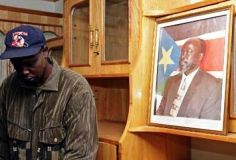Garang’s death sparks violence, speculation
By Noel King
KHARTOUM, Aug 3, 2005 (IPS) — Chaos ruled the streets of the Sudanese capital, Khartoum, earlier this week as citizens from south Sudan set off homemade bombs and engaged in gunfire with police and armed forces. This followed news that vice president and former rebel leader John Garang had died.

|
|
A southern Sudanese man mourns the death of Sudan’s former rebel leader of Sudan People’s Liberation Movement and First Vice-President John Garan near his photograph in Nairobi August 1, 2005. (Reuters). |
Sudan’s government said the death occurred on Sunday, when Garang’s helicopter crashed into a mountain in the south during poor weather conditions. The United Nations confirmed this account — but rumours were still rife in Khartoum that Garang had died as the result of a government conspiracy. This prompted the violent demonstrations.
Authorities called the allegations unfounded, and cautioned against conspiracy theories.
”You cannot speculate now, in this time of mourning,” said Rashid Khider, secretary general of the External Information Council, responding to rumours that Garang’s helicopter was brought down intentionally. Khider added that the former rebel chief had been flying on a Ugandan craft after an official visit to Uganda, and that Sudanese officials knew little of his flight plans.
Nonetheless, by midmorning on Monday, Khartoum was cloaked in silence as cars and buses left the streets. With the first sounds of gunfire, women could be seen ducking into buildings, while men edged away from the shots.
Civilians stood on rooftops in central Khartoum where it was possible to see black smoke emanating from the presidential palace where President Omar Al-Bashir has offices; later, smoke was billowing from at least three different parts of the city.
Police eventually told civilians to come down from the buildings; security forces then watched the city from the rooftops. Aid workers in the wealthy suburb of Amarat said the fighting had spread there as young men threw bricks and stones at cars.
Throughout the afternoon, gunfire and explosions could be heard in much of Khartoum. Inhabitants of the city had little to say as they barricaded themselves in office buildings and homes, a few noting that a state of emergency was certain to be instated – something that made them wary of answering questions.
Those pedestrians and drivers who did try to reach the city centre were turned away by police and army personnel who lined the streets of Khartoum. Security forces packed into the back of pickup trucks moved throughout the city.
Armed men in civilian dress also took turns questioning drivers, although it was unclear whether the men were plain clothes security officers or, as some said, civilians who had taken up weapons to protect themselves.
This reporter witnessed a suspected instigator of the violence being beaten to the ground by Sudanese police and men in civilian clothing. The man was kicked while on the ground, then dragged away by police.
In the early afternoon, an uneasy calm fell over central Khartoum, nearly four hours after the fighting there began. Shopkeepers emerged to inspect the damage done to their stores, many wasting no time in sweeping up shattered windows and smashed produce. People also took advantage of the restored cellular phone network to contact family members and friends.
Government later imposed a curfew, after which the only sound was the call of sirens as emergency vehicles made their way across the city. It also released a press statement urging all citizens to remain calm.
Some fear the death of Garang may derail the January peace accord that ended the war between Sudan’s northern Islamist government and southern rebels from the Sudan People’s Liberation Movement/Army (SPLM/A). Garang’s appointment to the vice presidency, which formed part of that agreement, had seen him return to Khartoum for the first time in two decades: he took office Jul. 9.
But, the administration insisted the peace accord would last beyond the former rebel leader’s death.
”The peace process has been made by Dr John Garang and the government of Sudan, and the two sides believe that this process is under the ownership of the Sudanese people. It is not Garang’s or Bashir’s. It has nothing to do with personalities,” said Khider. A commander in the SPLM/A, Salva Kiir Mayardit, will assume the vice presidency.
But even as arrangements were being put in place for Sudan’s government to continue work after the events of Sunday, some had yet to absorb the fact of the former rebel’s death.
”He’s alive. Nobody can kill him — I don’t believe it. If he’s dead I’m going to be dead too, right now. If he’s dead on the street, I will be dead,” said William, a south Sudanese man who declined to give his last name.
Others found reasons to be optimistic. ”Peace is going on,” said Santos McCoy, an artist and teacher living in Khartoum. ”Peace is going on. Everything is alright.”
